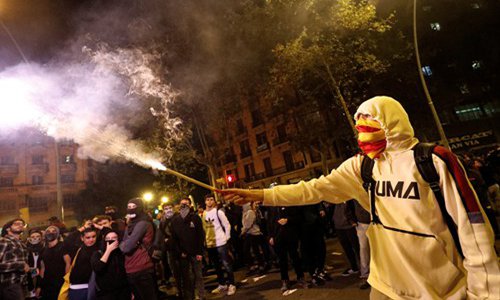
A demonstrator holds a flare during protest after a verdict in a trial over a banned Catalonia's independence referendum in Barcelona, Spain, on October 16. Photo: VCG
When Hong Kong protesters claimed to "stand with Catalonia" and planned for the next protest on Thursday, they failed to understand the matter in a geopolitical context. The only similarity that protests share is worsening violence that challenges the rule of law.
Comparing Hong Kong protests to those in Catalonia, and the way of covering and portraying social movements also indicates double standards of the West.
Anti-government protesters in Hong Kong called for support for Catalans on Thursday night in Chater Garden on Hong Kong Island, so as to "stand against tyranny," according to a new poster circulating on social media. The city, which has been engulfed in escalating violence, entered the 20th weekend of protests during the past weekend.
Hong Kong protesters, using social network apps such as LIHKG and Telegram, have been spreading their messages, aiming to gain more attention from the global community. However, observers say that tying up with the Catalan pro-independence movement is not smart, urging Hong Kong radicals, many of whom are youngsters, to stop protesting and to learn their history and geopolitical affairs at school.
After nine Catalan separatist leaders were sentenced to up to 13 years in prison, anti-government forces began descending into the streets, expressing their dissatisfaction with the verdict.
Some protests turned violent and protesters paralyzed the Barcelona airport, leading to hundreds of flights being canceled, and media reports suggested that the protests in Catalonia and Hong Kong shared similarities, especially in movement strategies.
Do Catalans really care about Hong Kong? Or are Hong Kong protesters delusional to think that the global community would support them as they seek more allies? Such naïve thinking indeed contradicts the reality, according to observers.
Such a tie-up helps both cities gain global intention, but the situation in the two places is not comparable, said a local geopolitical expert who preferred not to be named. The Catalan issue has little geopolitical leverage inside the EU, as no country would risk jeopardizing relations with Spain. They also fear that separatism and populism would rise in their own backyards, hurting the integration of the EU and the European economy.
So why does the West give so much voice to Hong Kong? The US has so many common interests with Spain that it would not incite or encourage separatism within the country. But the West shares fewer common interests with the Chinese mainland so why not make a fuss over Hong Kong to counterbalance Beijing?
That's also part of the reason why there was less Western media coverage of the Catalonia protests than the Hong Kong unrest. In a recent New York Times article, rioters who damaged public property and hurt ordinary people were portrayed as fighters who would be willing to die for freedom.
Support for violence or rioters echoes the West's purpose of intervening in Hong Kong affairs and creating trouble for the mainland.
"Why don't Hong Kong protesters understand that they may lose help from Western countries if they continue seeking support for Catalan separatists, who are not favored by major powers such as the EU and the US?" an online commentator said, noting that Hong Kong protesters just showed to the world they hardly understand geopolitics.
When black-clad protesters in Hong Kong waved Catalan flags at protests in Kowloon on Sunday, demonstrators in Barcelona said they didn't even know what was going on in Hong Kong, according to local media reports.
There was only one poster showing the "Black Bauhinia" at the recent pro-independence protest in the Spanish city, reports said. When the reporters asked a protester why she was holding such a poster and whether she understood what it meant, she said "no, I don't, I just Googled it."
Apparently, the only similarity that the Hong Kong and Catalonia protests share is escalating violence. Tsunami Democratic, a social media group that has organized some protests, is using tactics such as calling for assembly on Telegram and spreading videos and photos to distort narratives of law enforcement by the police.
"I don't know what's going on in Hong Kong, but I saw a video clip showing a protester there kick a police officer's face," a Catalan protester was quoted as saying in the local media. "I think that gives some ideas for youngsters here when they confront the police," he said.
Catalan President Quim Torra also played down any correlation between Hong Kong and Catalonia. "I don't think the two cases are comparable," he was quoted as saying in recent media reports.
The authors are Beijing-based freelance commentators. opinion@globaltimes.com.cn

